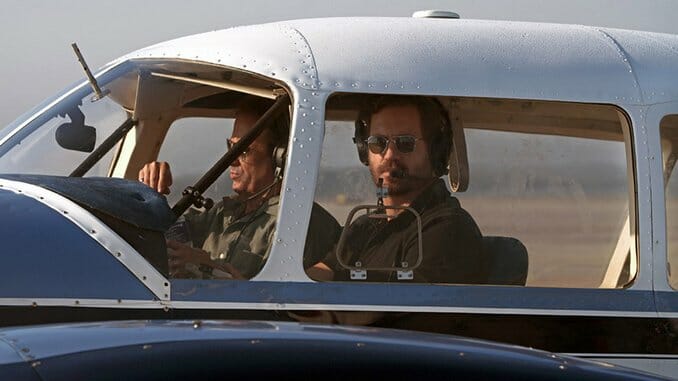Olivier Assayas’s Wasp Network Administers an Antidote to Blockbuster Sexlessness
Images via Netflix
Olivier Assayas’s Wasp Network, released on Netflix only last week, seems to have already secured a designation as “minor.” A Netflix sans-theatrical release in the midst of a global pandemic does indeed feel like a death knell that will doom it to footnote-dom, which might have eventually been the case in a fully functioning world; perhaps circumstances only initiated the pulling of the trapdoor lever, expediting its fall to some underworld of B-side auteur films, where it was bound to land anyway. That fate, however, is not a just one. This may not be Assayas operating at the peak of his powers, but there’s no use in denying the thrilling efficiency that propels the overstuffed yet nimble two hours of Wasp Network.
In early 1990s Havana, pilot René González (Édgar Ramírez) defects from Cuba to the United States, leaving behind his wife, Olga (Penélope Cruz), and his young daughter. Once stateside, he begins running rescue missions for sea-stranded defectors with a group of anti-Castro Cuban exiles out of Miami. Only René is not as he appears—he’s a spy sent by the Cuban government to infiltrate groups hostile to national interests, part of a budding network of operatives, organized by Gerardo Hernández (Gael García Bernal), who hope to thwart any would-be aggression on Cuban soil.
The film, adapted from the 2011 book The Last Soldiers of the Cold War by Fernando Morais, explores many of Assayas’s staple preoccupations: the resounding impact of globalization under Western ideology, the question of what it means to enact revolution, intercontinental traipsing, the crosscultural jumble of communication in the modern technological world. His characters often find themselves at the crosshairs of these issues, grappling with the many contradictions they seem to pose. These ideas, employed differently across each of his films, are of course not virtues in and of themselves without considering how they appear, and here Assayas embeds them within an espionage genre film, where their presence is, though obvious, less clearly delineated than as in works like Clouds of Sils Maria (2014) or his previous film, Non-Fiction (2018). Those are talkative films in which characters actively discuss the philosophical components and implications of their concerns; Carlos (2010), which will inevitably be seen as the superior counterpart to Wasp Network due to thematic similarities and shared leading man, gets to be both a film of action and philosophy—in part due to its 5 hour-plus run time. But the characters of Wasp Network are first and foremost men of action. If anything, the verbal philosophizing comes primarily from those in opposition to the spies, a sort of cloak under which we can see René’s beliefs as antithetical to what we’re hearing.
If the characters are men of action, the pacing of the film reflects that: Perhaps too much happens in Wasp Network, and we are occasionally left with glances when a long stare might have been better suited. Regardless of whether the totality coalesces, the editing is so jarringly efficient that scenes move from one to the next with a determined propulsion, even as the film lurches forwards and backwards in time. Within scenes, too, cuts are decisive and expeditious, such as when Juan Pablo Roque (Wagner Moura), a suave suit- and Rolex-wearing spy who comes to briefly enjoy the excesses of US culture, swims from Cuba to Guantanamo Bay to request asylum. Assayas shows us quick glimpses of the journey, from Roque’s beachside bus ride, to donning his wetsuit, to midnight swimming, to his arrival upon the rocks of Guantanamo—a brief procedural which on a micro-level reflects the film’s macro-level speed, moving through essential action and emotion without much lingering but with a declarative certainty.